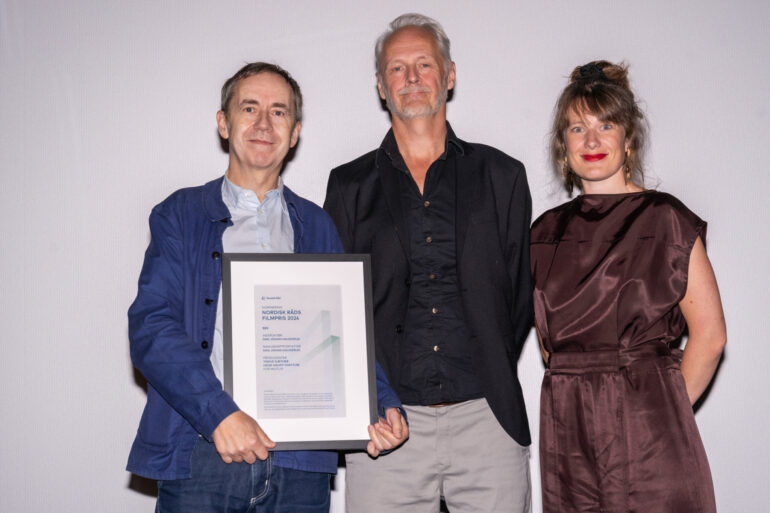Written by: Marta Balaga
26.09.24
Director/writer and producers of Sex talk trilogy and killing the audience with kindness.
Sex, the first part of the trilogy Sex Dreams Love (Sex Drømmer Kjærlighet), premiered at the Berlinale. Now nominated for the Nordic Council Film Prize 2024, Dag Johan Haugerud’s gentle dramedy sees people explore their sexuality and conflicting emotions – including two chimney sweepers, suddenly faced with new physical sensations and moral dilemmas. One has a sexual encounter with another man for the first time in his life, another turns into a woman in his dreams. But their director, who also wrote the script, never judges them.
Following Love’s screening in Venice, with Dreams already waiting around the corner, Haugerud – also behind award-winning Beware of Children (Barn) – and his producers Yngve Sæther and Hege Hauff Hvattum discuss the film produced by Motlys, co-produced by Viaplay Group Oslo and sold by m-appeal world sales.
When I first heard about your plan to make this arthouse trilogy, I was surprised. Was there a lot of resistance to that idea?
Dag Johan Haugerud: It gives you an opportunity to work continuously for a longer period of time and develop these topics and themes on a much wider scope, from different perspectives and points of view. It also allows you to explore different universes at the same time and, in effect, make use of a much broader palette. If one idea doesn’t fit in one film, you make room for it in the next. I found the planning and preparation more inspiring than in my previous films, because – for a short while – it felt like the possibilities were endless.
Yngve Sæther: At first, we tried to finance a short. It was called Sex Love Infidelity, if I remember correctly, but a consultant at the Film Institute was hoping for something similar to Beware of Children. We were a bit frustrated by that. Then we sat down, and Dag Johan said: “Well, I have another idea.”
When the trilogy was first mentioned, I thought: “Kieślowski!” It sounded fun, but unrealistic. We reached out to a new consultant at the Norwegian Film Institute, and she was very supportive, even though getting them involved in three films at the same time hasn’t been done before. Then we tried Viaplay, and the timing was just right. With his latest film, Dag Johan established himself as one of the major directors in Norway. People wanted to see his new work.
When Sex came out, people assumed it would be explicit and shocking. Mostly because of the title, obviously. And yet there is so much kindness and tenderness in these two films.
Yngve Sæther: Many people approached us, commenting on that. Especially after Love premiered in Venice. They said they could count on one hand how many films give them such a warm hug. For those who know Dag Johan, it wasn’t surprising. He has a warm heart, and he always looks at people with empathy. It’s as if he was saying: “We are all special, even though we are ordinary.”
At the beginning, just having a project by Dag Johan that’s called Sex was funny to us. He’s not really interested in showing it, but we knew it could attract attention. My ambition was to “get” Dag Johan outside of Norway with these films.
Looking at all the Nordic Council Film Prize nominees this year, there are other light-hearted films on this list. Does is mean that people are looking for arthouse films with some humour?
Dag Johan Haugerud: If you care for your characters and you want the audience to feel sympathy towards them too, humour might be an important element to achieve this. And since humour is such a big part of everyday life, it tends to make both the characters and the set-up more believable. At least that’s my view.
Yngve Sæther: Trying to get people back into cinemas after the pandemic has been hard. All the buyers I spoke to when we were pitching the project said they can’t afford to invest in something people won’t watch. I don’t think the arthouse audience is afraid of dark films, but maybe when they finally do go to the cinema, they want a “lighter” experience? Especially in dark times like these.
Hege Hauff Hvattum: Light humour and kindness also help us be more open to what the film actually explores. If it would be very explicit or forcing some answers on the viewers, perhaps it would be harder to do that? These films, they invite you to join in the discussion. When the characters are kind to each other, it’s easier to listen to what they have to say.
Yngve Sæther: When we go to the cinema, we expect conflict. We expect crisis. We are told that every story needs this, but depicting everyday life and all its nuances demands even more from its creators. They have to make sure it doesn’t feel boring, and Dag Johan proves it’s possible. People love watching this kindness you mentioned before. We should do that more often.
It’s still a brave film, however, especially in the way it tackles male vulnerability.
Yngve Sæther: I remember when I read the first draft. I found it so funny. Dag Johan wanted it to feel believable, even though it might be a rare conversation for men to have. He wanted to show it as something that could happen and maybe should happen more often. We are more used to seeing women talking like this, so it might be a bit of a utopia, but wouldn’t it be nice if men expressed this kind of sensibility? I love films that try to push people this way. When everyone turns right, they turn left. I guess it has to do with his curiosity about human nature.
Hege Hauff Hvattum: We do hear that a lot when people talk about the film: “It’s a utopia.” But we are not born this way – we learn how to hide things. Dag Johan thinks we can unlearn it. So yes, maybe it’s utopian, but it’s also possible.
Dag Johan Haugerud: Society expects different expressions of feelings from men than from women. That might be a cliché, but it probably still informs us and affects our behaviour. That being said, I don’t believe that this feeling of awkwardness, insecurity or vulnerability is connected to gender. The way we express it might be, but not the emotion itself.
To listen to the Nordic Film Talks podcast with Haugerud: CLICK HERE.
Official trailer:
The film will be screened at NCFP events in Stockholm and Reykjavík. To read more about Sex: CLICK HERE.
The Nordic Council Film Prize was first awarded in 2002 and then permanently established in 2005, and is to be juxtaposed with the Nordic Council Literature Prize, the Children & Young People's Literature Prize, the Music Prize, and the Environment Prize. The winner of the prizes will be announced October 22 via RÚV.

